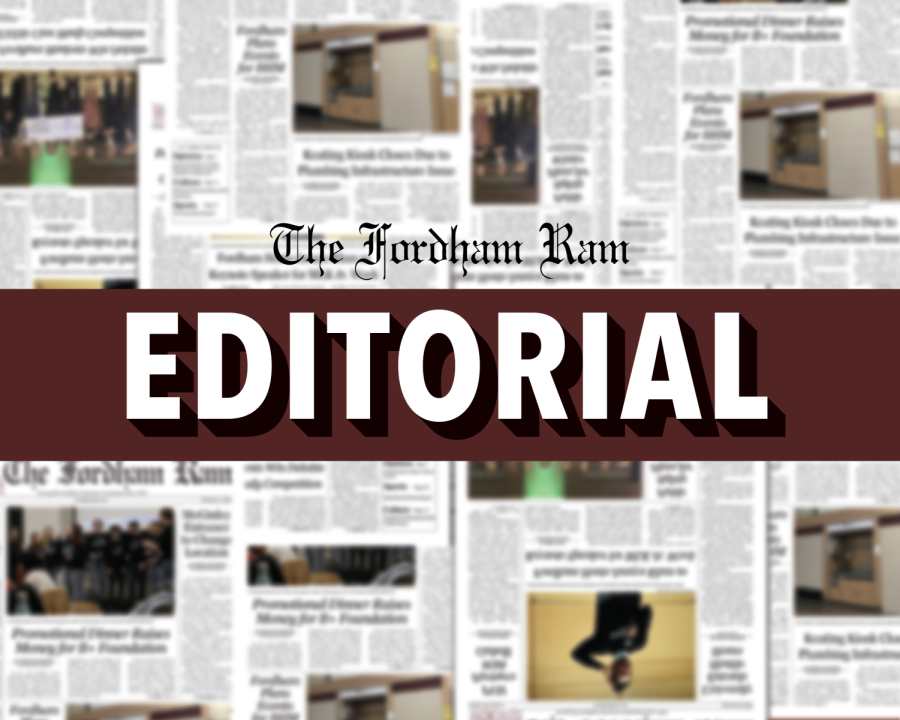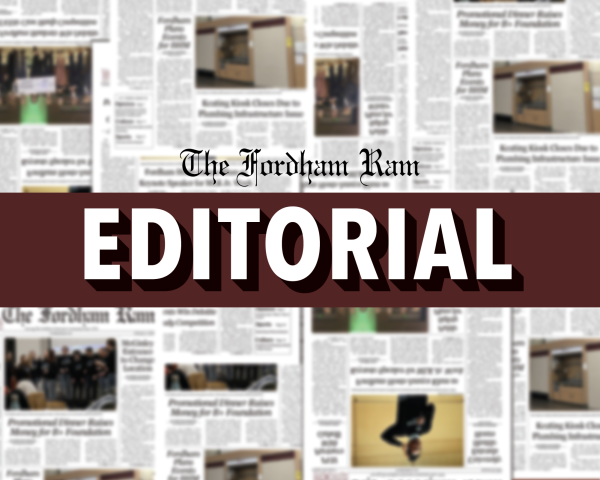Fordham is a Fair-Weather Catholic School
It’s a conversation that has been circulating around campus for decades. It is a request students have been making for years. And it is a stance the university has not wavered on. The hot button topic that has come back into focus following comments made by President Tania Tetlow at the March 1 student press meeting is the access to contraceptives on Fordham’s campus.
Nothing has changed surrounding the access and policies of contraceptives being made available on campus, but what is new is the rhetoric coming from the university president. President Tetlow revealed to the panel of student journalists that while she herself holds beliefs that are different from the Catholic Church’s doctrine on the use of contraception, Fordham won’t be changing the policies surrounding this issue unless the Catholic Church changes said doctrine.
The rationale behind withholding access to contraceptives on campus being simply related to church doctrine seems far-fetched. Fordham does not seem to have a problem with supplying university funding to break away from other doctrine-based decrees. While this is not a comprehensive list of every way Fordham picks and chooses when to be a Catholic institution, this is a small sampling of Fordham’s financially-backed breaks from Catholic doctrine.
The first deviation from doctrine that Fordham has allowed, by supplying club funding, is the support and allowance of LGBTQ+ affinity groups to form. The stance of the Roman Catholic Church on LGBTQ+ support is to offer help, in the form of prayer, in regards to “self-mastery.” Essentially, what this translates to is the encouragement of identity suppression for those who are part of the LGBTQ+ community. Fordham’s sponsorship of a PRIDE Alliance goes beyond simply providing a space for student advocacy; the university actively budgets and provides money for the students to plan group activities.
It is a requirement from Catholic doctrine for people to attend mass every Sunday. Fordham does not implement a requirement to attend mass services for any students. Fordham touts the ideal of being a welcoming community for all faith denominations and in order to not chase students (and their tuition payments) away, mass attendance is not required.
If the rationale for not requiring mass attendance is due to the multi-faith community that makes up Fordham, then why is that same logic not applied to the contraceptive policies as well? The policy on access to contraception could follow in a similar vein to mass attendance: personal preference based on individual beliefs.
Another area in which Fordham deviates from the prescribed doctrine is the serving of meat on Fridays in Lent. It is a Catholic tradition to abstain from eating meat every Friday in Lent as a form of sacrifice. Along the same lines, derived from the Bible in Leviticus, eating shellfish makes a person “unclean,” however, that does not prevent the Marketplace from serving shrimp. Fordham uses dining funds to purchase and serve meat on Fridays in Lent and shellfish throughout the school year. These may seem like small examples, but if the reason behind withholding access to contraceptives on campus is Church doctrine then why are these exceptions, whether big or small, allowed?
Looking outside of Fordham, the Ram investigated whether other Jesuit institutions have the same stance on access to contraceptives. Universities such as Fairfield University and Sacred Heart do not provide on-campus contraceptives to students through the on-campus health center. However, similar to Fordham, their health insurance plans cover various forms of birth control prescribed by an outside provider. Other Jesuit institutions, such as Georgetown University, only started including birth control coverage in their health insurance plan for students in 2012. Georgetown now adopts a similar policy to Fordham in that students can be prescribed birth control for a medical condition that is documented, however, they also point out that Georgetown will not pay or fund birth control prescriptions through their healthcare plan.
While Fordham seems to be in step with other Jesuit institutions, there is a common stipulation among these universities pertaining to prescribing birth control that is a red flag. The piece about documenting a health condition in order to receive the prescription can be more difficult to obtain than it may first appear as many reproductive health concerns are dismissed without further testing. This difficulty in obtaining documentation could result in those who need a birth control prescription being denied one, meaning this lack of university funding for birth control on campus could infringe on their ability to carry out daily tasks such as attending class.
Fordham is cherry-picking which aspects of the Catholic doctrine to uphold and which are not only fine to let fall by the wayside, but actively provides the funding that allows for the break from the doctrine. This is truly one of the only pieces of Catholic social teaching that is still being clung to and it begs the question of why? Why is it okay to deviate from everything else the church prescribes, but not this one issue? President Tetlow can try to win over student opinion on this matter by claiming to be personally against this doctrine, but the logic behind keeping this in place does not add up.












































































































































































































Benedict Reilly • Mar 28, 2023 at 7:37 pm
To imply that being an authentically Catholic school requires LGBTQ+ exclusion, mandatory mass attendance, and not serving meat on Fridays in Lent (which the author should take another look at, because the Marketplace always offers extra vegetarian options on Fridays in Lent), is insulting, dangerous, and wholly undermines the legitimate effort to increase contraceptive access on campus. Saying that supplying contraceptives will undermine Fordham’s Catholic identity plays into the hands of those who do not want contraceptives at Fordham.
Patrick Cullinan • Mar 25, 2023 at 8:11 am
This is the most annoying thing Fordham students get worked up over. Just walk across the street to Walgreen’s, for God’s sake.